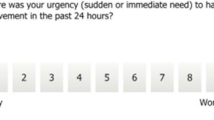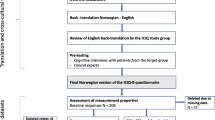Abstract
Introduction and hypothesis
We describe the responsiveness and minimally important difference (MID) of the Accidental Bowel Leakage Evaluation (ABLE) questionnaire.
Methods
Women with bowel leakage completed ABLE, Patient Global Impression of Improvement, Colo-Rectal Anal Distress Inventory, and Vaizey questionnaires pretreatment and again at 24 weeks post-treatment. Change scores were correlated between questionnaires. Student’s t tests compared ABLE change scores for improved versus not improved based on other measures. The MID was determined by anchor- and distribution-based approaches.
Results
In 266 women, the mean age was 63.75 (SD = 11.14) and 79% were white. Mean baseline ABLE scores were 2.32 ± 0.56 (possible range 1–5) with a reduction of 0.62 (SD = 0.79) by 24 weeks. ABLE change scores correlated with related measures change scores (r = 0.24 to 0.53) and differed between women who improved and did not improve (all p < 0.001). Standardized response means for participants who improved were large ranging from −0.89 to −1.12. Distribution-based methods suggest a MID of −0.19 based on the criterion of one SEM and −0.28 based on half a standard deviation. Anchor-based MIDs ranged from −0.10 to −0.45. We recommend a MID of −0.20.
Conclusions
The ABLE questionnaire is responsive to change, with a suggested MID of −0.20.

Similar content being viewed by others
References
Ng KS, Sivakumaran Y, Nassar N, Gladman MA. Fecal incontinence: community prevalence and associated factors—a systematic review. Dis Colon Rectum. 2015;58(12):1194–209.
Meyer I, Richter HE. Impact of fecal incontinence and its treatment on quality of life in women. Womens Health (Lond, Engl). 2015;11(2):225–38.
Mokkink LB, Terwee CB, Patrick DL, Alonso J, Stratford PW, Knol DL, et al. International consensus on taxonomy, terminology, and definitions of measurement properties: results of the COSMIN study. J Clin Epidemiol. 2010;63:737–45.
Rogers RG, Sung VW, Lukacz ES, Fairchild P, Arya LA, Barber MD et al for the PFDN Network. Accidental bowel leakage evaluation (ABLE): a new patient-centered validated measure of accidental bowel leakage symptoms in women. Dis Colon Rec 2019;63(5):668–77.
Crosby RD, Kolotkin RL, Williams GR. Defining clinically meaningful change in health-related quality of life. J Clin Epidemiol. 2003;56(5):395–407.
Jelovsek EJ, Markland AD, Whitehead WE, Barber MD, Newman DK, Rogers RG, et al. Controlling faecal incontinence in women by performing anal exercises with biofeedback or loperamide: a randomised clinical trial. Lancet Gastroenterol Hepatol. 2019;4(9):698–710.
Jelovsek EJ, Markland AD, Whitehead WE, et al. Controlling anal incontinence in women by performing anal exercises with biofeedback or loperamide (CAPABLe) trial: design and methods. Contemp Clin Trials. 2015;44:164–74.
Sung V, Rogers RG, Bann CM, Arya L, Barber MD, Lowder J, et al. Symptom outcomes important to women with anal incontinence: a conceptual framework. Obstet Gynecol. 2014;123(5):1023–30.
Vaizey CJ, Carapeti E, Cahill JA, Kamm MA. Prospective comparison of faecal incontinence grading systems. Gut. 1999;44(1):77–80.
Barber MD, Walters MD, Bump RC. Short forms of two condition-specific quality of life questionnaires for women with pelvic floor disorders (PFDI-20) and PFIQ-7. Am J Obstet Gynecol. 2005;193(1):103–13.
Wei JT, Dunn R, Nygaard I, Burgio K, Lukacz ES, Markland A. Development and validation of a quantitative measure of adaptive behaviors in women with pelvic floor disorders. Female Pelvic Med Reconstr Surg. 2017;23(4):232–7.
Jelovsek JE, Chen Z, Markland AD, Brubaker L, Dyer KY, Meikle S, et al. Minimum important differences for scales assessing symptoms severity and quality of life in participants with fecal incontinence. Female Pelvic Med Reconstr Surg. 2014;20(6):342–8.
Revicki D, Hays RD, Cella D, Sloan J. Recommended methods for determining responsiveness and minimally important differences for patient-reported outcomes. J Clin Epidemiol. 2008;61(2):102–9.
Norman GR, Sloan JA, Wyrwich KW. Interpretation of changes in health-related quality of life: the remarkable universality of half a standard deviation. Med Care. 2003;41(5):582–92.
Rejas J, Pardo A, Ruiz MA. Standard error of measurement as a valid alternative to minimally important difference for evaluating the magnitude of changes in patient-reported outcomes measures. J Clin Epidemiol. 2008;61(4):350–6.
McLeod LD, Coon CD, Martin SA, Fehnel SE, Hays RD. Interpreting patient-reported outcome results: US FDA guidance and emerging methods. Expert Rev Pharmacoecon Outcomes Res. 2011;11(2):163–9.
Acknowledgements
Cleveland Clinic: J. Eric Jelovsek, Principal Investigator; Marie Fidela R. Paraiso, Co-Investigator; Mark D. Walters, Co-Investigator; Beri Ridgeway, Co-Investigator; Brooke Gurland, Co-Investigator; Massarat Zutshi, Co-Investigator; Geetha Krishnan, Research Nurse; Ly Pung, Research Nurse; Annette Graham, Research Nurse.
Alpert Medical School of Brown University-Women & Infant’s Hospital of Rhode Island: Deborah L. Myers, Co-Investigator; Charles R. Rardin, Co-Investigator; Cassandra Carberry, Co-Investigator; B. Star Hampton, Co-Investigator; Kyle Wohlrab, Co-Investigator; Ann S. Meers, BS, RN, Research Supervisor; Kathryn Rhodes, BA, Senior Research Assistant; Erika Spearin, BS, Research Assistant.
Duke University Anthony Visco, Principal Investigator; Cindy Amundsen, Co-Investigator; Alison Weidner, Co-Investigator; Amie Kawasaski, Co-Investigator; Shantae McLean, Clinical Site Coordinator; Ingrid Harm-Ernandes, Interventionist; Jennifer Maddocks, Interventionist; Amy Pannullo, Interventionist; Akira Hayes, Clinical Research Coordinator; Acacia Harris, Clinical Research Coordinator; Robin Gilliam, Clinical Research Coordinator.
University of Alabama at Birmingham: Holly E. Richter, Principal Investigator; R. Edward Varner, Co-Investigator; Robert Holley, Co-Investigator; L. Keith Lloyd, Co-Investigator; Tracy S. Wilson, Co-Investigator; Alicia Ballard, Co-Investigator; Jeannine McCormick, Interventionist; Velria Willis, Research Nurse; Nancy Saxon, Research Nurse; Kathy Carter, Research Nurse; Julie Burge, Research Coordinator.
Northwest Texas Physicians Group Susan Meikle, Co-Investigator.
University of California, San Diego: Charles Nager, Principal Investigator; Michael Albo, Co-Investigator; Emily Lukacz, Co-Investigator; Cindy Furey, Interventionist; Patricia Riley, Interventionist; JoAnn Columbo, Research Coordinator; Sherella Johnson, Research Coordinator.
Kaiser Permanente—San Diego Shawn Menefee, Co-Investigator; Karl Luber, Co-Investigator; Keisha Dyer, Co-Investigator; Gouri Diwadkar, Co-Investigator; Jasmine Tan-Kim, Co-Investigator; Giselle Zazueta-Damian, Research Coordinator; Linda Mackinnon, Research Coordinator.
University of New Mexico: Yuko Komesu, Co-Investigator; Gena Dunivan, Co-Investigator; Peter Jeppson, Co-Investigator; Sara Cichowski, Co-Investigator; Christy Miller, Interventionist; Erin Yane, Interventionist; Julia Middendorf, Research Nurse; Risela Nava, Research Coordinator; Karen Taylor, Research Nurse.
RTI International: Marie G. Gantz, Principal Investigator; Dennis Wallace, Alternate Principal Investigator; Amanda Shaffer, Research Operations Manager; Poonam Pande, Chemistry, Manufacturing, and Controls Project Leader; Kelly Roney, Regulatory Project Leader; Benjamin Carper, Statistician; Ryan E. Whitworth, Statistician; Lauren Klein Warren, Statistician; Kevin A. Wilson, Clinical Research Informatics Project Leader; Brenda Hair, Clinical Research Informatics Manager; Kendra Glass, Data Manager; Daryl Matthews, Data Manager; James W. Pickett, II, Programmer; Yan Tang, Programmer; Tamara L. Terry, Research Services Manager; Lynda Tatum, Research Services Supervisor; Barbara Bibb, Programmer; Jutta Thornberry, Program Manager; Kristin Zaterka-Baxter, Clinical Study Specialist; Lindsay Morris, Research Coordinator.
University of Pennsylvania: Heidi Harve, Co-Investigator; Uduak Umoh Andy, Co-Investigator; Michelle Kingslee, Research Coordinator; Lorraine Flick, Research Nurse.
University of Pittsburgh: Halina M. Zyczynski MD, Principle Investigator; Pam Moalli PhD, MD, Co-Investigator; Gary Sutkin MD, Co-Investigator; Jonathan Shepherd MD, Co-Investigator; Michael Bonidie MD, Co-Investigator; Steven Abo, MD, Co-Investigator; Janet Harrison MD, Co-Investigator; Christopher Chermansky MD, Co-Investigator; Lori Geraci, Research Coordinator; Judy Gruss, Research Coordinator; Karen Mislanovich, Research Coordinator; Ellen Eline, Interventionist; Beth Klump, Interventionist; Susan E. George, DPT, Interventionist.
University of North Carolina at Chapel Hill: William E. Whitehead PhD, Co-Investigator.
Sources of Support: U10 HD041261, U10 HD069013, U10 HD054214, U10 HD054215, U10 HD041267, U10 HD069025, U10 HD069010, U10 HD069006, U01 HD069031.
Author information
Authors and Affiliations
Corresponding author
Ethics declarations
Financial disclaimers/conflicts of interest statement
R.G. Rogers: royalties from UpToDate, DSMB chair for the TRANSFORM Trial sponsored by AMS, ABOG travel and stipend, ACOG travel, IUGA travel and stipend; V.W. Sung: none; E.S. Lukacz: consultant for Axonics; research support for Boston Scientific, Uroplasty/Cogentix, Pfizer, royalties from UpToDate; P. Fairchild: none; L. Arya: none; M. Barber: royalties from Elsevier and UpToDate; A. Markland: none; N.Y. Siddiqui: research grant from Medtronic Inc.; C.M. Bann: none.
Contributions
All authors contributed to the following: protocol/project development, data collection, management and analysis, manuscript writing.
Additional information
Publisher’s note
Springer Nature remains neutral with regard to jurisdictional claims in published maps and institutional affiliations.
For the NICHD Pelvic Floor Disorders Network.
Rights and permissions
About this article
Cite this article
Rogers, R.G., Bann, C.M., Barber, M.D. et al. The responsiveness and minimally important difference for the Accidental Bowel Leakage Evaluation questionnaire. Int Urogynecol J 31, 2499–2505 (2020). https://doi.org/10.1007/s00192-020-04367-5
Received:
Accepted:
Published:
Issue Date:
DOI: https://doi.org/10.1007/s00192-020-04367-5




